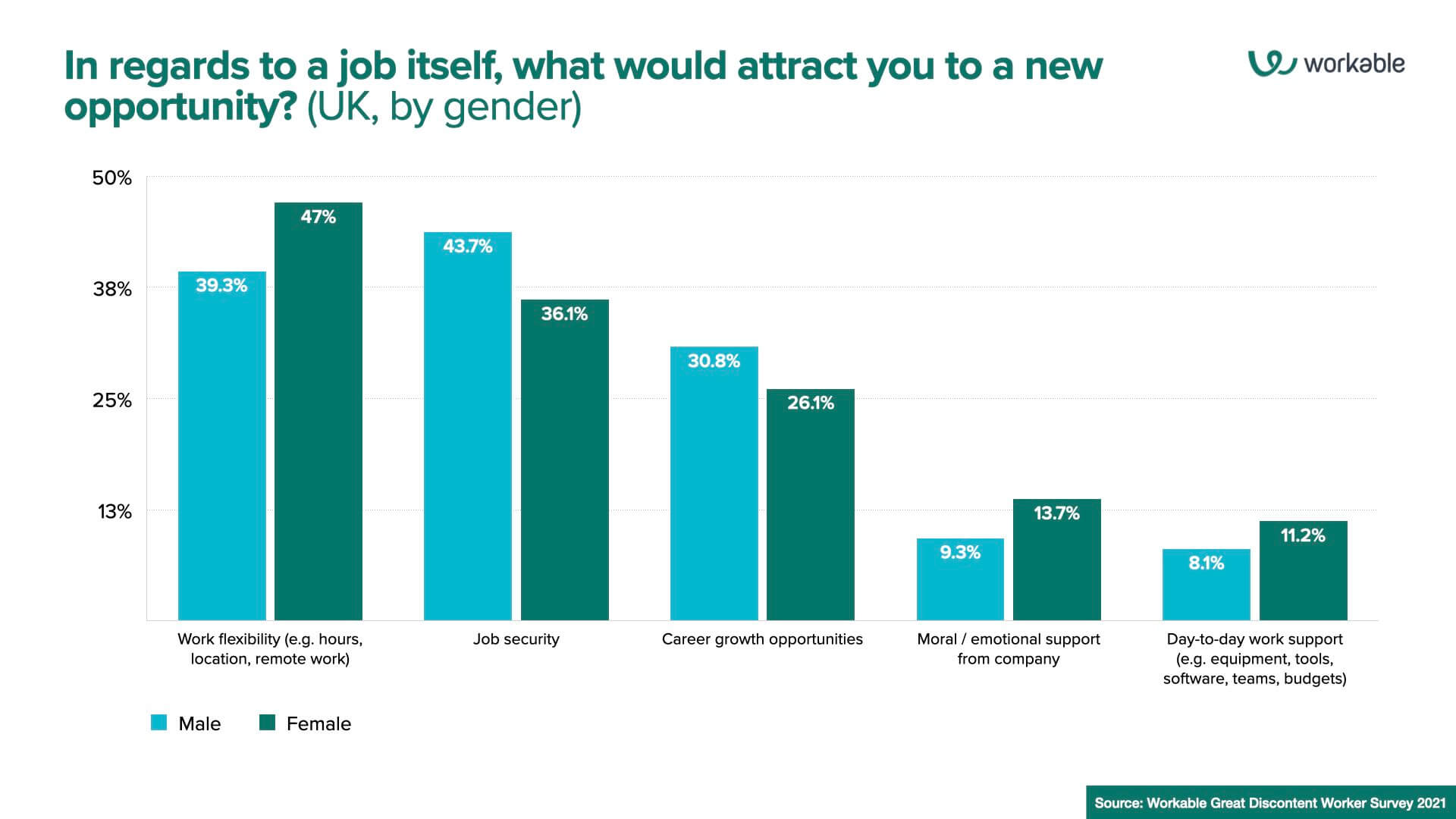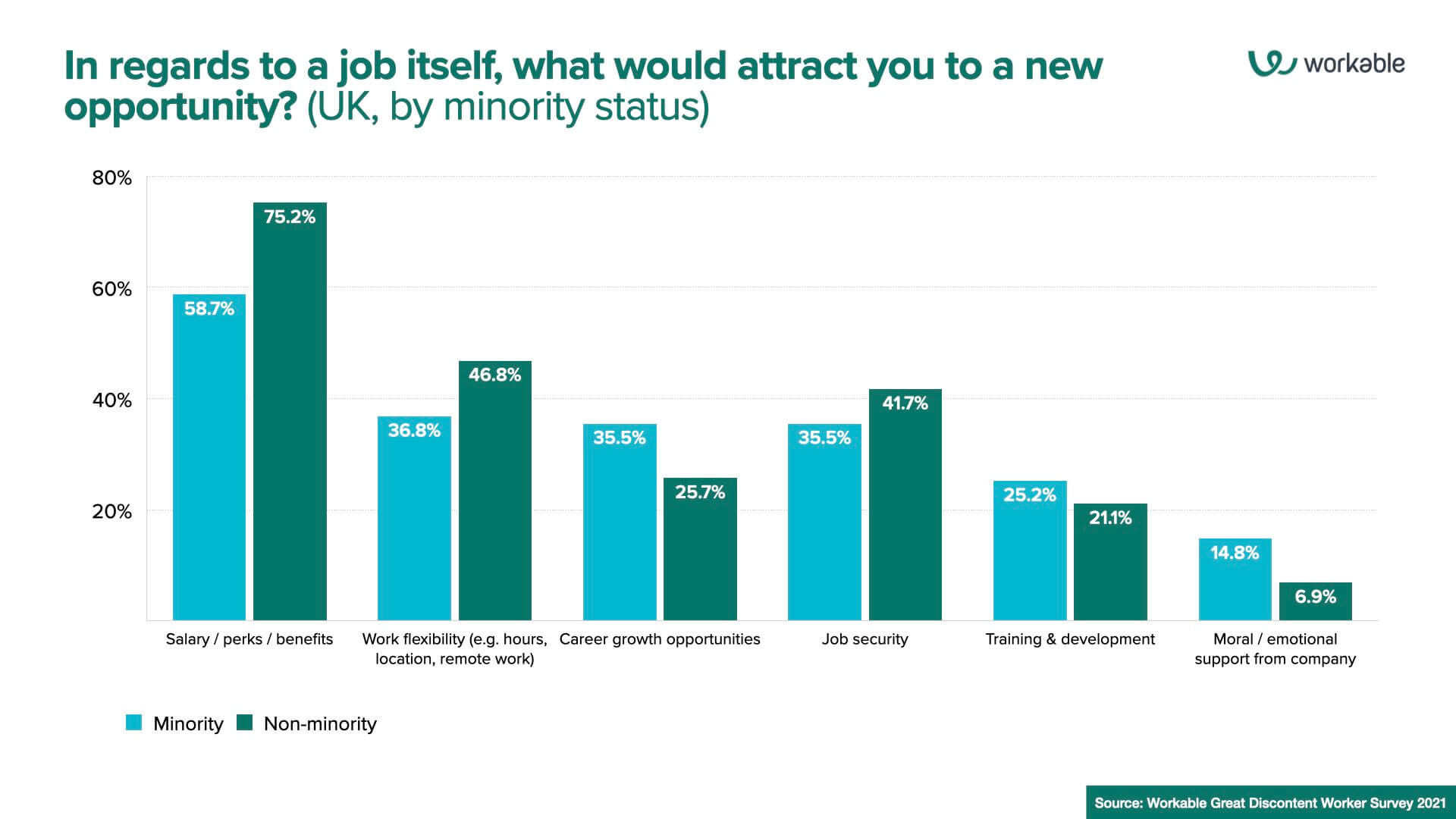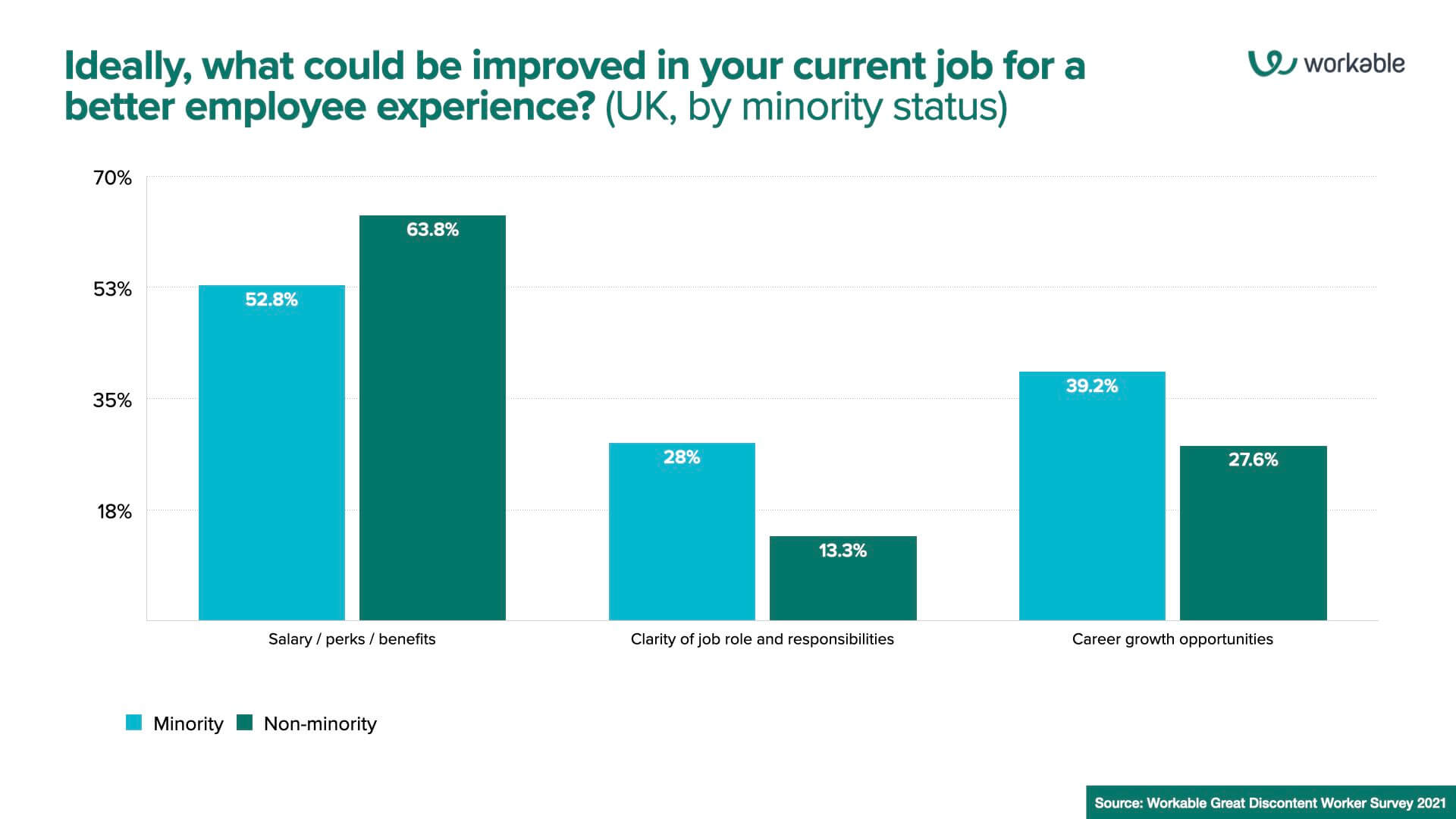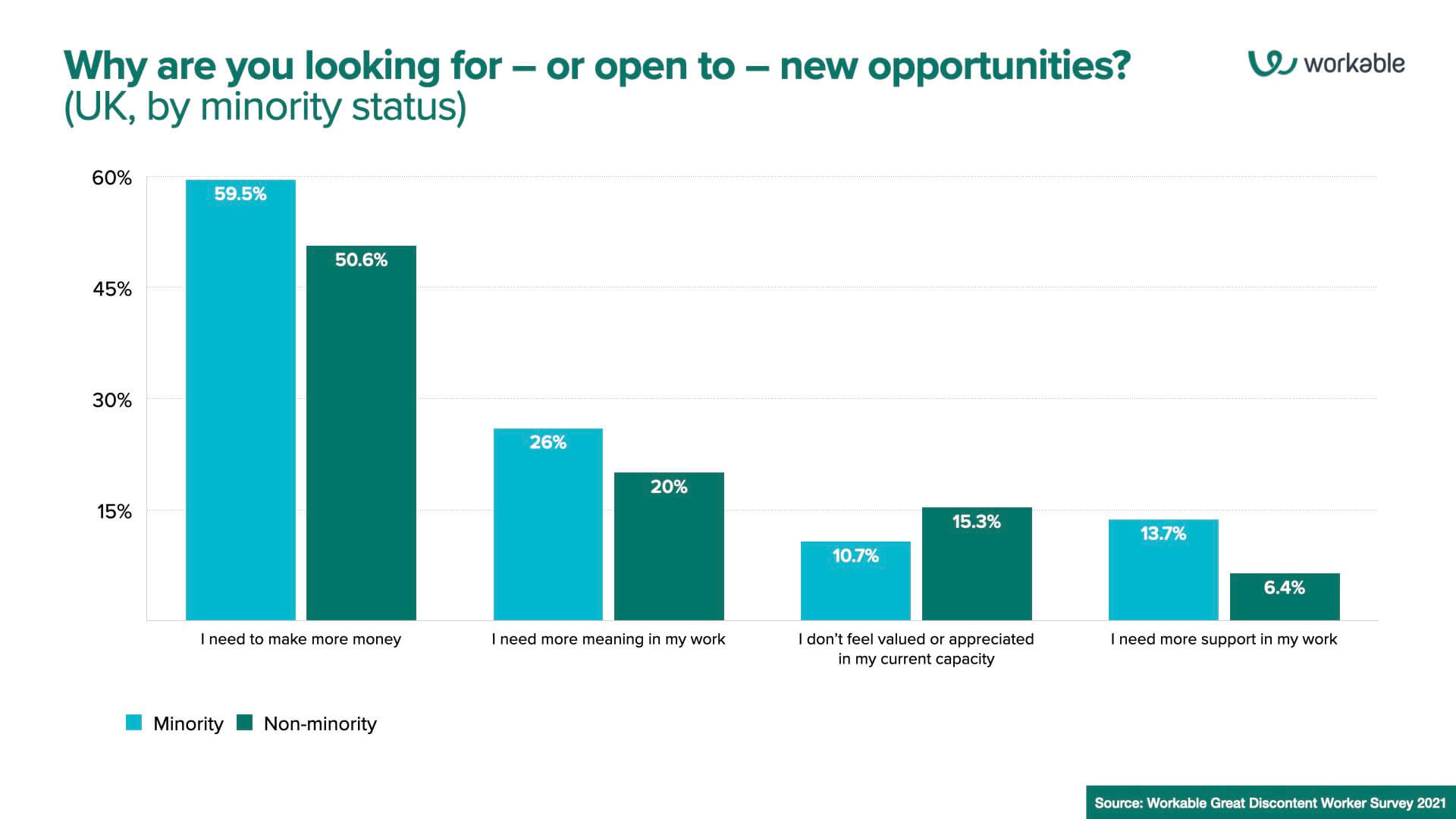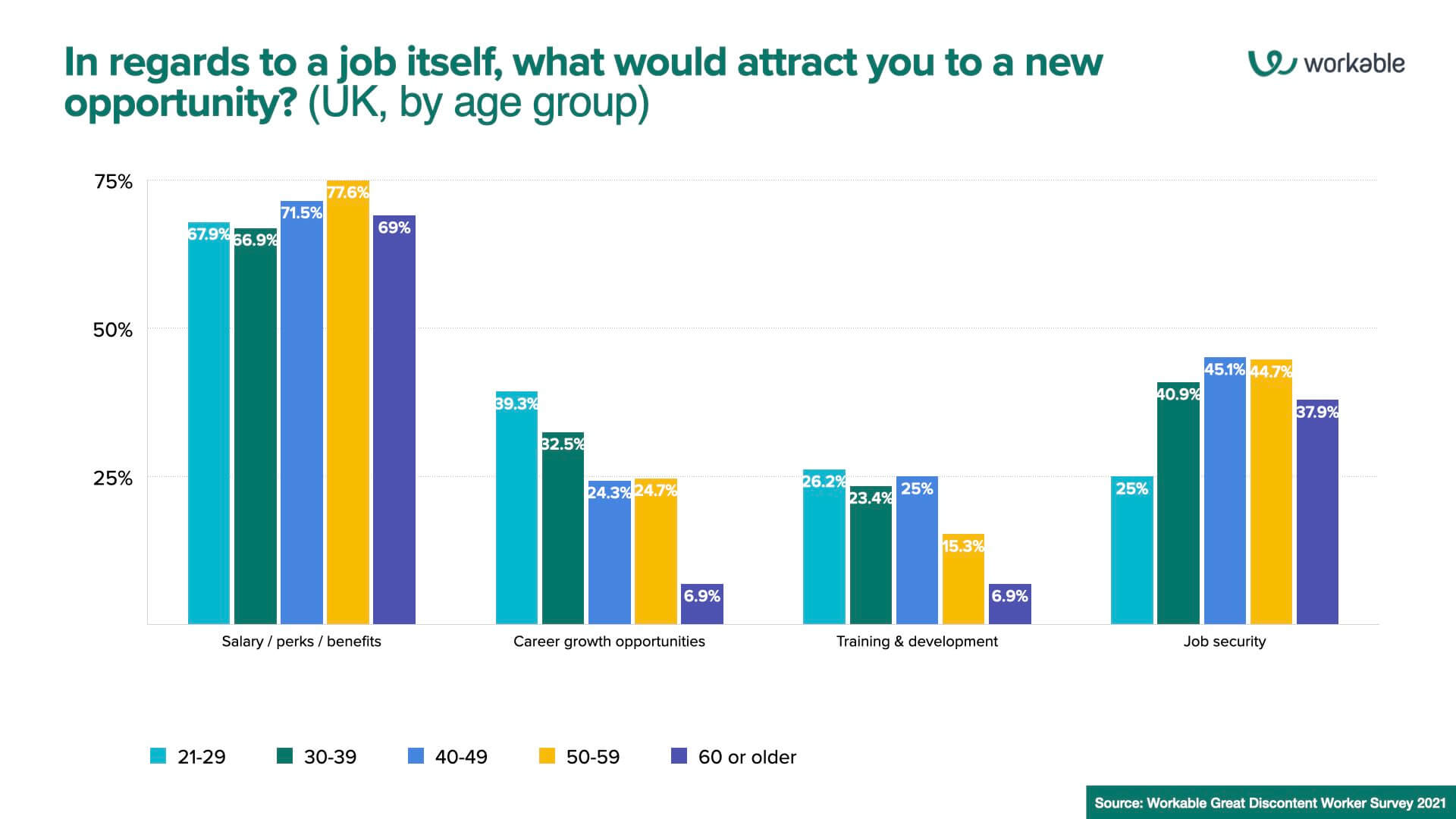Different UK workers appreciate different things in a job
While compensation reigns high and mighty across all groups regardless of gender, minority status, age, and whatnot, some groups put more value on compensation than others. Also, the next most popular features of a new job are vastly different across different groups.

So, let’s take a look at what those popular features are for each demographic, according to our Great Discontent survey of 500 workers in the UK.
Females want more flexibility
First, we found differences by gender identity. Those identifying as male lean to factors around longevity and ascension, such as job security (43.7% vs. 36.1%) and career growth opportunities (30.8% vs. 26.1%), when thinking about what would lure them to a new opportunity.
Those identifying as female pointed to factors not necessarily about the actual day-to-day job itself, but rather about the supportive aspects of working life. For instance, if a mother is able to leave work early to pick up her kids or meet other home life obligations – all with the express support and encouragement of their employer – that’s hugely valuable for them.
The data shows this: work flexibility (47% vs. 39.3%) and moral / emotional support from the company (13.7% vs. 9.3%) are more important for females in the UK than for males. Day-to-day work support also is preferred more by females – 11.2% choose this attractor compared with 8.1% of males.
The priority of compensation doesn’t differ all that much – both genders ranked it equally high (71.7% for males, 69.5% for females).
This is not to suggest that career growth and job security aren’t important to those identifying as female – rather, these responses indicate that there are other needs that have to be met in order to make their working arrangement feasible and better aligned with their personal needs and priorities.
Minorities want more support
One of the demographic questions we asked in the survey was; “Do you identify as a member of a minority group (be it race, ethnicity, language, religion, country of origin, sexual orientation, gender, or another characteristic)?”. Three out of 10 (30.9%) say they do, compared with 66.1% who say they don’t, and 3% prefer not to say. So we also looked at responses based on those answers.
We found significant differences in minority status when asking about top attractors to a new job. Those identifying as a minority placed less priority on the most popular items than their non-minority peers, particularly compensation (58.7%% vs. 75.2%). We also found significant differences in work flexibility (36.8% vs, 46.8%) and job security (35.5% vs. 41.7%).
So, what’s more important in a new job opportunity for someone who identifies as a minority? Career growth opportunities (35.5% vs. 25.7%) is a big one, followed by training & development (25.2% vs. 21.1%).
Although not a popular overall item, moral / emotional support from their company (14.8% vs. 6.9%) is still a much higher priority for minority respondents than for non-minority respondents.
Likewise, when asked about what their current employer could do to improve employee experience, minorities are twice as likely to want more clarity of job role and responsibilities (28% vs. 13.3%), and more likely to want better career growth opportunities (39.2% vs. 27.6%).
Again, this doesn’t mean that salary isn’t important for those identifying as minorities. In fact, it’s actually more so. When asked to choose just one reason why they’re looking for – or open to – new opportunities, three out of five (59.5%) picked compensation, compared with half (50.6%) of non-minorities.
“I need more meaning in my work” is also a more popular reason for minorities than non-minorities (26% vs. 20%), and “I need more support in my work” is likewise a higher priority (13.7% vs. 6.4%).
On the flip side, non-minorities are more likely to say they don’t feel valued in their present capacity (15.3% vs. 10.7%).
This suggests that minorities in the UK are more likely to want support from their employer in other areas in addition to compensation. There’s also a need to find more meaning in work, something that can also be delivered by a thoughtful and supportive employer who values its people.
Compensation grows with age
Likewise, we found differences across ages among UK workers. Salary is more valued in older generations, whereas career growth opportunities are more valued by younger generations. Those in the combined 21-39 age bracket ranked salary less than those in the 40-59 age brackets did (66.9%-67.9% vs. 71.5%-77.6%).
Career growth opportunities trends sharply in the opposite direction, with those in the 21-29 age bracket valuing that significantly higher than those in the combined 40-59 age bracket (39.3% vs. 24.3%-24.7%).
Younger generations also lean to training and development whereas their older peers are more aligned with the need for job security.
This makes sense, as those in older generations will tend to be past the peak of their career development and starting to migrate out of the workforce – perhaps increasing the need to build up their financial support base as they prepare for retirement.
Younger generations, on the other hand, are heavily inclined towards progressing in their career with training & development being a logical ingredient in that.
Why is all this stuff important?
Let’s face facts. Money makes the world go around. It’s also a powerful measuring stick when showing the value you place on what someone brings to your company. Also, the correlation between money and happiness has been strongly established, including in a comprehensive survey carried out in 2016.
And the reason why, says study author Matthew Killingsworth of Penn’s Wharton School, who carried out a similar study in the US:
“When you have more money, you have more choices about how to live your life. You can likely see this in the pandemic. People living paycheque to paycheque who lose their job might need to take the first available job to stay afloat, even if it’s one they dislike. People with a financial cushion can wait for one that’s a better fit. Across decisions big and small, having more money gives a person more choices and a greater sense of autonomy.”
More choices, more autonomy, more command over all aspects of life. Keep that thought in mind as you proceed in your talent attraction game.
This is an excerpt from our Great Discontent survey report – want to read the whole thing? Check it out here.

